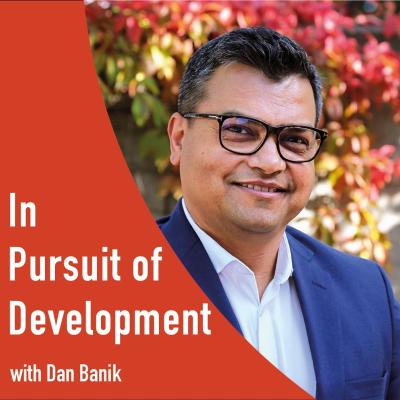
In Pursuit of Development
Podcast af Dan Banik
Unlock a World of Insight: Your Passport to Global Development! Embark on a journey that transcends borders and transcends boundaries. Our podcast is your gateway to a deeper understanding of democracy, poverty eradication, and the urgent battle against climate change. In each episode, we transport you to the heart of developing and "emerging economies" in Africa, Asia, and Latin America. As we tackle the world's most pressing issues, we don't just dwell on problems; we spotlight innovative solutions and success stories that are making a difference on the ground. Your host, Professor Dan Banik, leads the way from the University of Oslo. Tune in to this intellectual adventure and become part of the change! 🌎🎧 @danbanik @GlobalDevPod
Prøv gratis i 7 dage
99,00 kr. / måned efter prøveperiode.Ingen binding.
Alle episoder
142 episoderSeason finale! It is my great pleasure to welcome back a person I have very much enjoyed speaking with earlier— Dan Honig [https://danhonig.info/bio], an Associate Professor of Public Policy at University College London and Georgetown McCourt School of Public Policy (@rambletastic) [https://twitter.com/rambletastic]. His latest book is Mission Driven Bureaucrats: Empowering People To Help Government Do Better [https://danhonig.info/missiondrivenbureaucrats]. Mission-driven bureaucrats, according to Dan, are individuals who work within the bureaucracy with a genuine desire to serve their organization's mission of helping citizens. They perform their jobs out of a strong belief in their purpose, rather than being driven by a set of rules or incentives that compel them to act in specific ways. But what are the historical roots of the term "mission," and how can mission-driven bureaucrats thrive? The book argues that the key to better government lies in empowerment and trust, rather than stricter controls and more rigorous oversight. Key highlights * Introduction – 00:24 * Mission driven bureaucrats – 04:04 * Managers like Ted Lasso – 18:21 * Managing for empowerment versus managing for compliance – 25:12 * Demotivated and unmotivated bureaucrats – 37:46 * Characteristics of efficient bureaucracies around the world – 35:06 * New public management and the centrality of citizens – 43:52 Host Dan Banik [https://www.sum.uio.no/english/people/aca/danbanik/] (@danbanik [https://twitter.com/danbanik] @GlobalDevPod) [https://twitter.com/GlobalDevPod] Apple [https://podcasts.apple.com/us/podcast/in-pursuit-of-development/id1517346182] Spotify [https://open.spotify.com/show/3QvVNE6ccMbdxGTbCGUgjZ] YouTube [https://www.youtube.com/@GlobalDevPod] Subscribe: https://in-pursuit-of-development.simplecast.com [https://in-pursuit-of-development.simplecast.com] https://globaldevpod.substack.com/ [https://globaldevpod.substack.com/]
The liberal international order, characterized by rules-based multilateralism and values such as openness and representation, is often portrayed in terms of multiple crises. These crises, often analyzed from a Western perspective, include the reduced support of some Western powers towards certain multilateral institutions and the establishment of new ones by rising powers. However, these narratives often overlook the perspectives of low and middle-income countries, which is why in this episode, we shift our focus to understand how the Global South perceives and engages with this international order. Rohan Mukherjee is an assistant professor at the Department of International Relations, at the London School of Economics and Political Science (LSE). His latest book is Ascending Order: Rising Powers and the Politics of Status in International Institutions [https://www.cambridge.org/gb/academic/subjects/politics-international-relations/international-relations-and-international-organisations/ascending-order-rising-powers-and-politics-status-international-institutions?format=HB]. @rohan_mukh [https://x.com/rohan_mukh] Key highlights * Introduction – 00:24 * Global governance viewed from the Global South – 02:54 * Crisis of authority and new bargains – 09:57 * Rising powers and the politics of status – 16:05 * The quest for status and symbolic equality within the international system – 24:14 * Institutional openness and procedural fairness – 35:06 * Admitting rising powers into the great power club – 46:37 Host Dan Banik [https://www.sum.uio.no/english/people/aca/danbanik/] (@danbanik [https://twitter.com/danbanik] @GlobalDevPod) [https://twitter.com/GlobalDevPod] Apple [https://podcasts.apple.com/us/podcast/in-pursuit-of-development/id1517346182] Spotify [https://open.spotify.com/show/3QvVNE6ccMbdxGTbCGUgjZ] YouTube [https://www.youtube.com/@GlobalDevPod] Subscribe: https://in-pursuit-of-development.simplecast.com [https://in-pursuit-of-development.simplecast.com] https://globaldevpod.substack.com/ [https://globaldevpod.substack.com/]
The ever-evolving world of global power dynamics is characterized by the complex relationships between large economies such as the United States and China and how these interactions are perceived and navigated by countries in the Global South. Understanding these dynamics requires a comprehensive view of how some countries, such as China, position themselves as a challenger to the existing world order and US hegemony through their economic, structural, and normative power. While many countries in the Global South are finding it challenging to navigate the complex terrain of great power competition, some are leveraging their unique positions to maximize benefits and assert their sovereignty. They engage strategically with multiple great powers, negotiating deals and leveraging relationships to their advantage, balancing economic needs, security concerns, and political aspirations. Ilaria Carrozza [https://www.prio.org/people/11404]is a senior researcher at the The Peace Research Institute Oslo (PRIO). Her research focuses on understanding how China extends its influence abroad and challenges the existing world order. @ilaria_carrozza [https://x.com/ilaria_carrozza] Resources * Shaping the Digital Architecture: Contested Norms on Digital Technology in Southeast Asia [https://www.prio.org/publications/13514] * China’s Digital Silk Road and Malaysia’s Technological Neutrality [https://thediplomat.com/2023/08/chinas-digital-silk-road-and-malaysias-technological-neutrality/] * Dual-Use AI Technology in China, the US and the EU: Strategic Implications for the Balance of Power [https://www.prio.org/publications/13150] * Winds of Change? The Impact of Non-Western Powers’ Engagement in Afghanistan and the Sahel [https://www.prio.org/publications/13451] * How Does the China-Russia Partnership Impact Security Dynamics in East Asia? [https://www.prio.org/publications/13671] Key highlights * Introduction – 00:24 * Great power competition viewed from the Global South – 03:30 * The Russia-China alliance and resurgence of the BRICS – 11:40 * Global development and global security concerns – 18:50 * Chinese versus Western alternatives – 37:42 Host Dan Banik [https://www.sum.uio.no/english/people/aca/danbanik/] (@danbanik [https://twitter.com/danbanik] @GlobalDevPod) [https://twitter.com/GlobalDevPod] Apple [https://podcasts.apple.com/us/podcast/in-pursuit-of-development/id1517346182] Spotify [https://open.spotify.com/show/3QvVNE6ccMbdxGTbCGUgjZ] YouTube [https://www.youtube.com/@GlobalDevPod] Subscribe: https://in-pursuit-of-development.simplecast.com [https://in-pursuit-of-development.simplecast.com] https://globaldevpod.substack.com/ [https://globaldevpod.substack.com/]
A central theme in Ian Shapiro's extensive body of research is the concept of domination, which captures the reactive nature of human beings towards power structures. Unlike traditional political theories that imagine societies designing just orders from scratch, Ian argues that political institutions evolve in response to the rejection of unacceptable power dynamics. This reactive nature is evident in the historical shifts from feudalism to absolutism, and eventually to democracy, driven by people's resistance to absolute power. Ian Shapiro [https://shapiro.macmillan.yale.edu/] is Sterling Professor of Political Science and Global Affairs at Yale University. In his latest book Uncommon Sense [https://yalebooks.yale.edu/book/9780300272574/uncommon-sense/], he explores why citizens in many democracies are profoundly alienated and some democracies are in danger of failing. Key highlights * Introduction – 00:24 * The fight against domination – 02:50 * The role of political parties in resisting domination – 05:41 * Disillusionment with democracies and the role of deliberation – 11:24 * Amartya Sen and development as freedom – 23:16 * Betting on hope – 34:29 Host Dan Banik [https://www.sum.uio.no/english/people/aca/danbanik/] (@danbanik [https://twitter.com/danbanik] @GlobalDevPod) [https://twitter.com/GlobalDevPod] Apple [https://podcasts.apple.com/us/podcast/in-pursuit-of-development/id1517346182] Spotify [https://open.spotify.com/show/3QvVNE6ccMbdxGTbCGUgjZ] YouTube [https://www.youtube.com/@GlobalDevPod] Subscribe: https://in-pursuit-of-development.simplecast.com [https://in-pursuit-of-development.simplecast.com] https://globaldevpod.substack.com/ [https://globaldevpod.substack.com/]
Effective bureaucracies are pivotal in mobilizing resources, implementing development projects, and ensuring equitable distribution of growth benefits across all societal segments. Conversely, weak administrative systems often result in inefficiency, corruption, and the derailment of vital development efforts aimed at improving health, education, and economic opportunities. The significance of administrative capacity extends beyond immediate program implementation. Strong administrative systems ensure that the achievements of development policies are maintained over time, adapting to new challenges like technological changes, demographic shifts, and environmental sustainability. This adaptability is essential for long-term development outcomes, making the strengthening of bureaucratic institutions a fundamental aspect of enhancing overall state capacity. Sameen A. Mohsin Ali [https://www.sameenmohsinali.com/] is an Assistant Professor of International Development at the University of Birmingham. She works in the fields of comparative politics, development studies, and political economy, with a specialisation in the bureaucratic politics of Pakistan. @sameen_mohsin [https://twitter.com/sameen_mohsin] Resources * Citizen trust, administrative capacity and administrative burden in Pakistan’s immunization program [https://journal-bpa.org/index.php/jbpa/article/view/184] (open access) * Networks of effectiveness? The impact of politicization on bureaucratic performance in Pakistan [https://pure-oai.bham.ac.uk/ws/portalfiles/portal/153443912/Networks_of_Effectiveness_AAM.pdf] (author's accepted manuscript) * Pakistan election: the military has long meddled in the country’s politics – this year will be no different [https://theconversation.com/pakistan-election-the-military-has-long-meddled-in-the-countrys-politics-this-year-will-be-no-different-222443], The Conversation UK * Oral History, Collaboration and Research on Women Public Sector Workers in Pakistan [https://mhrc.lums.edu.pk/oral-history-collaboration-and-research-women-public-sector-workers-pakistan], with Sana Haroon, MHRC blog * Bureaucratic Reform [https://pide.org.pk/research/bureaucratic-reform/], Discourse, Pakistan Institute of Development Economics * The good, the bad and the ugly in Punjab’s new local government laws [https://herald.dawn.com/news/1398912]. Herald, 5 July, 2019. * Good sifarish, bad sifarish: A look at PML-N’s selective anti-corruption drive [https://www.dawn.com/news/1402564]. DAWN 19 April, 2018. * Pakistan: COVID-19, federalism and the first wave response. [https://www.routledge.com/Federalism-and-the-Response-to-COVID-19-A-Comparative-Analysis/Chattopadhyay-Knupling-Chebenova-Whittington-Gonzalez/p/book/9781032077901] (open access) Key highlights * Introduction – 00:24 * State capacity and administrative capacity – 03:26 * The role of patronage politics – 09:03 * Civil servant strategies to tackle political interference – 16:49 * Socialization strategies, motivation, and demotivation – 25:09 * Networks of effectiveness – 32:14 * Trust between citizens and the state – 45:16 Host Dan Banik [https://www.sum.uio.no/english/people/aca/danbanik/] (@danbanik [https://twitter.com/danbanik] @GlobalDevPod) [https://twitter.com/GlobalDevPod] Apple [https://podcasts.apple.com/us/podcast/in-pursuit-of-development/id1517346182] Spotify [https://open.spotify.com/show/3QvVNE6ccMbdxGTbCGUgjZ] YouTube [https://www.youtube.com/@GlobalDevPod] Subscribe: https://in-pursuit-of-development.simplecast.com [https://in-pursuit-of-development.simplecast.com] https://globaldevpod.substack.com/ [https://globaldevpod.substack.com/]
Prøv gratis i 7 dage
99,00 kr. / måned efter prøveperiode.Ingen binding.
Eksklusive podcasts
Uden reklamer
Gratis podcasts
Lydbøger
20 timer / måned



















